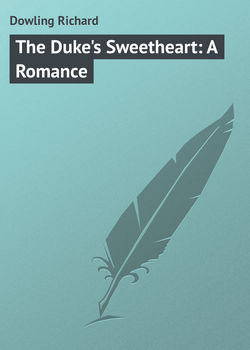The Duke's Sweetheart: A Romance

Реклама. ООО «ЛитРес», ИНН: 7719571260.
Оглавление
Dowling Richard. The Duke's Sweetheart: A Romance
PART I. THE DUKE OF LONG ACRE
CHAPTER I. THE DUKE'S SWEETHEART
CHAPTER II. A DUCAL CARRIAGE
CHAPTER III. A VILLAGE STORY
CHAPTER IV. A TOWN STORY
CHAPTER V. UNDER ANERLY BRIDGE
CHAPTER VI. WHAT'S IN A NAME?
CHAPTER VII. A STORY OF A CITY
CHAPTER VIII. ON BOARD THE YACHT "SEABIRD."
CHAPTER IX. THE MARQUIS OF SOUTHWOLD'S LETTER
CHAPTER X. ROUSING THE LION
CHAPTER XI. AT BANKLEIGH
CHAPTER XII. THE DUKE'S WEATHER
CHAPTER XIII. A NOR'-EASTER AT SEA
CHAPTER XIV. TWO DISCOVERIES
CHAPTER XV. AN INVISIBLE FOE
CHAPTER XVI. ON THE ROCKS
CHAPTER XVII. VOLUNTEER I
CHAPTER XVIII. VOLUNTEER II
CHAPTER XIX. THE RESCUE
CHAPTER XX. FAME
CHAPTER XXI. COINCIDENCES
CHAPTER XXII. THIRTY-FIVE YEARS AFTER
PART II. THE DUKE OF SHROPSHIRE
CHAPTER I. THE TWO CHEYNES
CHAPTER II. THE DREAD OF STRAWBERRY LEAVES
CHAPTER III. THE RETURN OF THE PRODIGAL
CHAPTER IV. THE IMPENDING CORONET
CHAPTER V. THE GLORIOUS PRIVILEGE
CHAPTER VI. A SUPPER WITHOUT A HOST
CHAPTER VII. ADRIFT
CHAPTER VIII. ON THE TRACK
CHAPTER IX. WAITING FOR NEWS
CHAPTER X "FIRE!"
CHAPTER XI. DAWN
CHAPTER XII. NIGHT
CHAPTER XIII. ON THE ROOF
CHAPTER XIV. A SILENT DRIVE
CHAPTER XV. THE MARRIAGE OF CHARLIE AND MAY
Отрывок из книги
Charles Augustus Cheyne, Duke of Long Acre, had no land. Neither in the United Kingdom nor in any other state of earth did he own a perch of ground. He did not own mines or railways, or Consols, or foreign or domestic stock of any kind. All the money he had was the result of his own industrious fingers, of his own industrious brain. Neither the Heralds' College nor the Lord Chancellor had ever heard of the Duke of Long Acre. The title was one purely of courtesy, conferred upon him by his peers, who were no peers of the realm, but untitled citizens of the Republic of Letters. If he was no duke, he would have furnished sufficient material for making two dukes of satisfactory size, as dukes go now. He was six feet tall, measured fifty inches round the chest, and forty-two round the waist. He had a large, beaming, good-humoured face. He wore no hair on his face; the hair of his head was of a dull dun colour, and always closely cut. No one could remember the colour of his eyes. He was reported to be the strongest and best-tempered man in Fleet Street. He could bend a kitchen-poker into a triangle, and bend it back again, so that one would scarcely notice it had ever been out of shape. He had never struck a man in anger, although he had been often sorely provoked, and more than once absolutely assaulted. On an occasion when a powerful rough attacked him, late at night, in one of the western squares, he had closed with his assailant, caught him round the body, first pinned one hand down, and then the other. Having given his prisoner a good squeeze, which nearly crushed the rough's ribs flat, Long Acre carried the man across the roadway, tossed him over the railings among some shrubs, and walked away. He was never known to curse or swear, or borrow money, or drink too much. His honour was above impeachment; he had never done anything mean or low or shabby. He was a gentleman in the perfect meaning of the word. He dressed in good taste; his clothes always looked fresh, although his coat was often far from new. He walked with the gait of one who would willingly stop to do a favour or lend assistance. He was sufficiently, not oppressively, attentive to women; when men were talking he would always step in gallantly to the rescue of a fair fame. He was loyal to his friends; he would have been forgiving to his enemies, if there were any, but none existed. He made friends very quickly. "I want all the friends I can make," he would say, "for I haven't a single relative alive."
He was thirty-four years of age, and lived in two rooms at the top of a house in Long Acre. With the exception of his rooms all the house was taken up with the business of carriage-making. The name of the carriage-maker was Whiteshaw.
.....
"'At last the toasting began; and now, for the first time, the attention of Belmore was withdrawn from the fire to be concentrated on the food. He had tasted food since he had felt the heat of a fire, but that food had been the simplest and most scanty. Convicts would have mutinied if they had been kept on such a scale as the poor gentleman had been obliged to adopt for a month; that is, if convicts, after a month of such diet, would have had strength enough to lift up their hands in menace.
"'At length the first piece of bacon was toasted. With a large pocket-knife De Montmorency cut off a slice of bread from a loaf, which had formed one of the parcels he had brought in; and having placed this on the chair-table, he removed everything else. Then he took up the saucer from the fire and put that on the table, and dropped the hissing crisp bacon into the rich straw-coloured gravy. He poured some gin out of the bottle into a cup, and added water from a jug.
.....